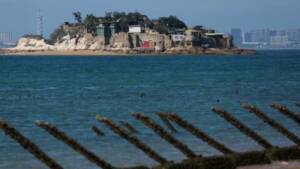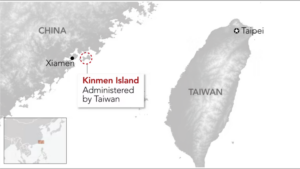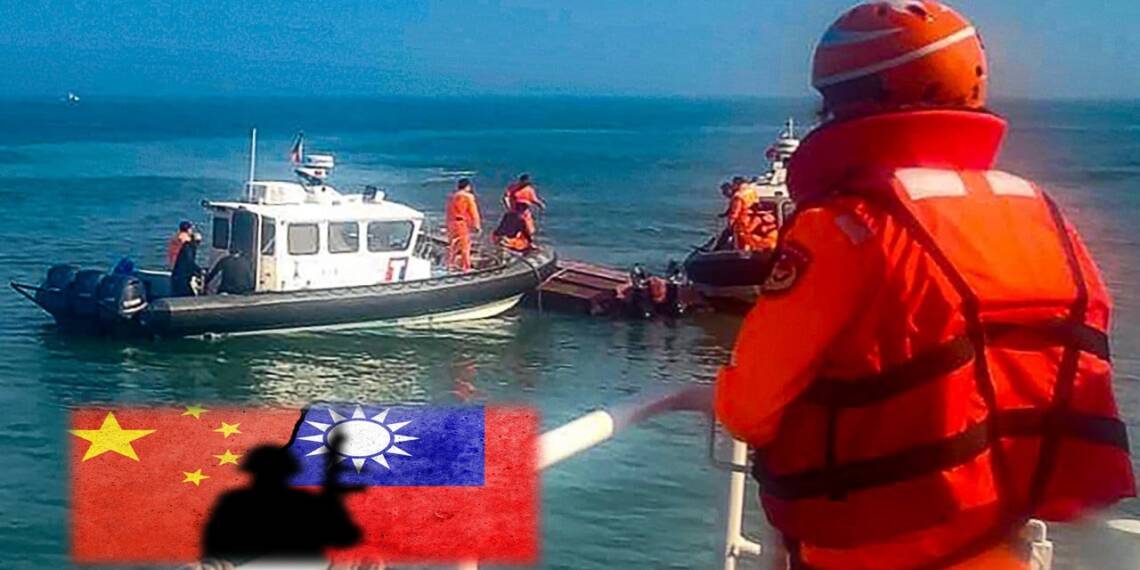Growing concerns surround the possibility of heightened tensions between China and Taiwan due to a recent maritime incident. Two Chinese individuals lost their lives in Taiwanese waters when their speedboat capsized last week. This incident has raised apprehensions about a potential escalation of hostilities.
Adding to the unease, Chinese coastal patrol boats conducted operations in the waters near the Kinmen archipelago, an area considered part of Taiwanese territory and situated in close proximity to China. During these operations, a Taiwanese tour boat was boarded for inspection by the Chinese authorities. The Taiwanese government expressed that this boarding caused a state of “panic.”
Join us on Telegram: https://t.me/tfiglobal
A departure from the established norm since the 1990s has been observed in the recent inspection activities. During this period, Taipei designated “restricted waters” encompassing the Kinmen and nearby Matsu islands. Over the years, Chinese and Taiwanese coast guard vessels adhered loosely to these defined boundaries.
Wen Lii, an official from Taiwan’s ruling Democratic Progressive Party, expressed concern over the deviation from convention, emphasizing that it disrupts the long-standing practice of respecting Taiwan’s restricted waters.
“This effectively amounts to an expansion of China’s law enforcement,” he said. “It also represents part of Beijing’s broader coercion, which includes frequent military incursions past the median line of the Taiwan Strait, and now in the waters around Kinmen.”

Communist China, despite never having governed Taiwan, a democratic island with a population of 23 million, asserts territorial claims and has intensified coercive measures in recent years, particularly under President Xi Jinping. The recent victory of Lai Ching-te from the Democratic Progressive Party (DPP) in Taiwan’s presidential race is anticipated to prompt further aggression from Beijing. Lai is widely recognized as a staunch advocate for Taiwan’s sovereignty and firmly rejects the idea of Taiwan being part of a larger Chinese polity.
“Following Lai’s victory in the January elections, there is strong reason to believe that what we’re seeing is escalation, with Beijing creating new, permanent facts on the ground,” said J. Michael Cole, a Taipei-based analyst with the International Republican Institute, a U.S.-government-backed nonprofit organization.
“We’ve gotten one step closer to an accident or miscommunication from which it would be very difficult for Beijing to de-escalate,” Cole said. “This salami-slicing tactic also puts Taipei in a very difficult position,” Cole said, referring to China’s patrols, illegal trespassing and inspection of the Taiwanese tourist boat.
Chinese and Taiwanese tourist boats inadvertently entering each other’s waters is a frequent occurrence, as noted by Kuan Bi-ling, the chief of Taiwan’s Ocean Affairs Council, in statements to reporters on Tuesday.
Read More: Taiwan in Crisis: Chinese Coast Guard’s Move Sparks Panic
Last week, a tragic incident unfolded when a boat carrying four Chinese individuals capsized within Taiwan’s waters, resulting in the loss of two lives. The Taiwanese coast guard reported that the vessel, located approximately one nautical mile from Kinmen, evaded inspection, fleeing after being instructed to stop. The two surviving fishermen were subsequently apprehended and repatriated to China on Tuesday afternoon.

Furthermore, Taiwan reported the expulsion of a Chinese coast guard boat from waters near Kinmen on Tuesday.
According to J. Michael Cole, the Taiwanese government faces a dilemma between perceived weakness in taking no action and potential provocation if enforcement measures are implemented. Such actions might trigger defensive retaliation or escalation by China.
On Wednesday, the Chinese government called on Taiwan to severely punish those responsible for the recent incident involving a capsized boat, meet the reasonable demands of the victims’ families, apologize to them, and provide an explanation. Beijing strongly condemned what it characterized as Taiwan’s brutal treatment of mainland fishermen and criticized Taiwan’s alleged “violent law enforcement” practices, accusing it of deliberately concealing the truth. Taiwan, in turn, denied these allegations.
Defense Minister Chiu Kuo-cheng emphasized that the Taiwanese military would not actively intervene to prevent a further rise in tensions. A government official, speaking anonymously, mentioned that while Taiwan remains firm in safeguarding water safety and fishermen’s rights, it will pursue goodwill and steady communication to address the unfortunate incident. Taiwan’s regular patrols in the waters will continue to protect its fishermen.
The Ministry of Taiwan’s China-facing division stated that unfortunate incidents arose due to constant intrusion by vessels with “three nos” characteristics – no ship name, no ship certificate, and no ship registration. The ministry emphasized that, as per cross-strait regulations, mainland Chinese ships are not allowed in Taiwan’s restricted and prohibited waters without permission.
Lii of the Democratic Progressive Party (DPP) highlighted the long-standing issue of illegal Chinese fishing adversely affecting residents in outlying islands. He cited environmental degradation and diminished marine life caused by activities like poisoning, sand dredging, and illegal practices. Lii noted that Taiwan’s Coast Guard Administration consistently aims to combat illicit activities and safeguard the rights of legal vessels.
Read More: Unseen Shadows: US Quietly Gears Up for Potential Conflict with China over Taiwan:
Local governments in Kinmen and Matsu, both under the control of Taiwan’s main opposition party, the Kuomintang (KMT), which advocates for closer ties with China, have consistently conveyed their concerns to Chinese authorities, albeit with limited impact, according to Lii.
On Wednesday, KMT leader Eric Chu voiced support for the government’s law enforcement efforts and extended condolences to the deceased. He emphasized that, as the ruling party, the Democratic Progressive Party (DPP) holds an absolute responsibility to diminish the risk of confrontation between the two sides and actively pursue dialogue.
The KMT, seeking closer ties, acknowledges the importance of law enforcement but also advocates for engagement. Conversely, the DPP, as the ruling party, faces the challenge of maintaining stability and reducing the risk of confrontation while upholding its commitment to Taiwan’s sovereignty and distinct identity.
Hence, the deviation from established norms, coupled with territorial disputes and differing political stances, heightens the risk of further confrontation between China and Taiwan.








